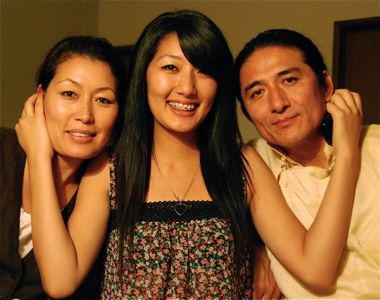
Tibetan music is deeply rooted in the spiritual tradition of Tibetan Buddhism. For thousands of years, music and dance were used to revere local deities who are considered the protectors of Tibetan’s environment. Through these traditions, musicians make connections to the spirit of nature and ask for support and protection. Until 1950, these traditional music forms lived only in communities in Tibet. After China’s occupation of Tibet, the rich traditions of Tibetan music, dance, and drama were supressed. In the early 1960’s, a group of master musicians went into exile in India and began slowly teaching these traditions to the younger generation. San Mateo-based musician and songwriter-in-exile Tashi Dhondup Sharzur (aka Techung) was one of the students to learn from these exiled masters.
Techung participated in ACTA’s 2009 Apprenticeship Program with his daughter Yangchen Lhamo in San Mateo and El Cerrito, California. During their apprenticeship, instruction in Yul Shae (folk songs) and Tho Shae (light classical songs from Central Tibet) offered Lhamo a proper introduction to the damnyen (Tibetan six-stringed lute). Instruction in Tho Shae singing trained Lhamo’s ability to strum and play the damnyen while singing. As a young teenager in exile in Dharamsala, India, Techung learned to play the damnyen from the late Gen Lusta. In addition to the damnyen, Techung was instructed in Yul Shae and Tho Shae. Techung has performed in India, the United States and Tibet as a soloist and educator, and in 1989 co-founded San Francisco-based Chaksam-Pa Tibetan Dance and Opera Company alongside Sonam Tashi and Lhamo’s mother Tsering Wangmo.
Watch the video below for excerpts of Techung’s and Lhamo’s lessons together in El Cerrito:
Participating in the Apprenticeship Program with his daughter, Techung wanted to have the chance to develop a direct working relationship with her as her teacher. During the apprenticeship they covered songs from the Yul Shae folk song tradition, including Kharak, an old song pre-dating Buddhism, and Tho Shae light classical song traditions originating in the Lhasa region in Central Tibet. One Tho Shae song Techung and Lhamo focused on is Jola Tashi, one of Techung’s favoriite songs which illustrates a tale about respecting the mountains as a metaphor for life and one’s intentions. As Techung paraphrases the song’s lyrics: “When we cross mountains, we pray and burn incense to honor the mountains. It’s alright if you make a mistake, forget to burn incense, as you can still go up the mountain with prayer flags.” The song, Techung notes, “creates auspiciousness and well-being for communities. Traditionally when we learn how to sing, we have to begin with singing Jola Tashi.”
 In addition to working with Lhamo to develop her ability to sing with the proper regional nuances and inflection as well as her ability to sustain notes, Techung introduced her to playing the damnyen. “It took me twenty to thirty years to learn how to play,” he notes, “It takes time, and there is no quick way to learn and continue the traditional teaching of the damnyen.” While traditional learning is challenging in the face of Lhamo’s imminent start to her college years and Techung’s international demand as a musician, both of them recognize the importance of sustaining the tradition so that it is not lost.
In addition to working with Lhamo to develop her ability to sing with the proper regional nuances and inflection as well as her ability to sustain notes, Techung introduced her to playing the damnyen. “It took me twenty to thirty years to learn how to play,” he notes, “It takes time, and there is no quick way to learn and continue the traditional teaching of the damnyen.” While traditional learning is challenging in the face of Lhamo’s imminent start to her college years and Techung’s international demand as a musician, both of them recognize the importance of sustaining the tradition so that it is not lost.
Lhamo’s few years being educated in Dharamsala and occasional visits back to family in exile in India deepened her exposure to Tibetan arts and culture. “I’m excited to see how the apprenticeship turns out, and in the end, I know I will learn something new from this.” She aspires to be able to teach others of the musical traditions she has learned from both Techung and her mother Tsering Wangmo. “I always had an interest in Tibetan songs, but never had the time to learn, and have always thought about it.”
In the following video, Tsering Wangmo and Lhamo sing the Eastern Tibetan folk song Aro Khampa in El Cerrito:
Lhamo’s parents, Techung and Wangmo, were instrumental in the founding and growth of San Francisco Bay Area-based Chaksam-Pa Tibetan Dance and Opera Company, a non-profit organization dedicated to preserving traditional Tibetan performing arts. which celebrates its twentieth anniversary in Oakland on November 21, 2009. Chaksam-Pa is a participant of ACTA’s Living Cultures Grants Program.
